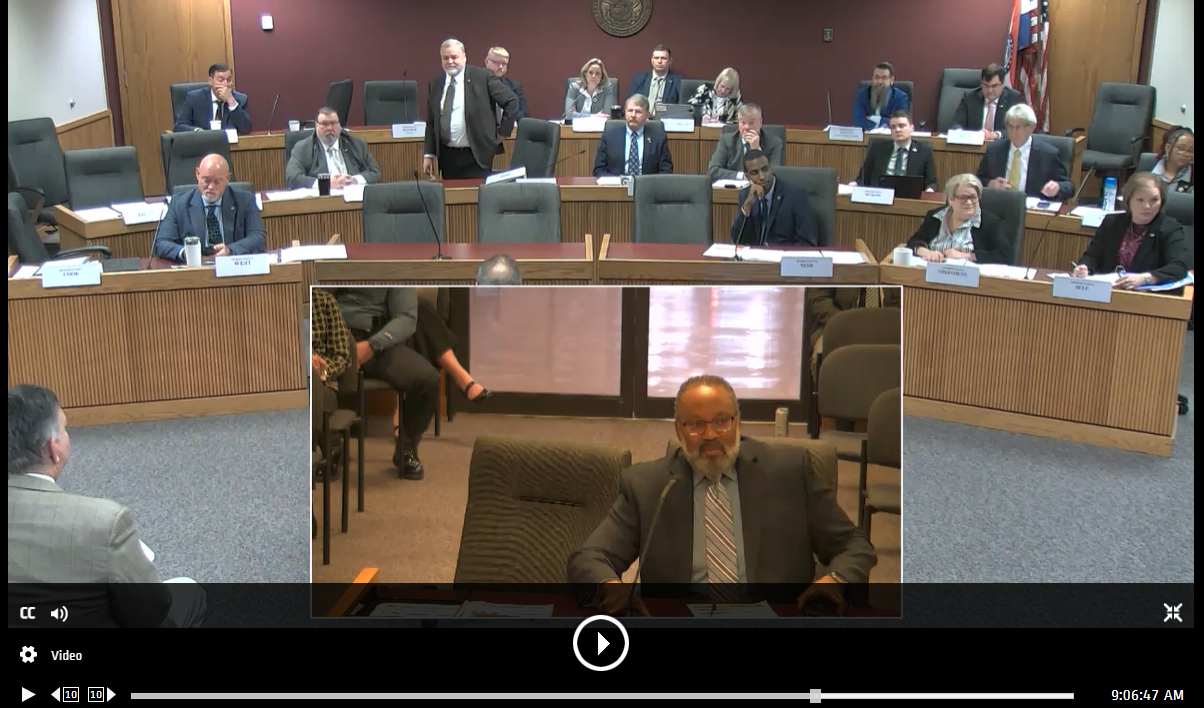2025 End of Session Report
The Mood at the Capitol
Each year we see more legislation passed that attempts to take us back to the days of segregation and Jim Crow. Thankfully, we are able to stand together to fight these bills and occassionally make advances in civil justice. This year we passed the CROWN Act to protect our young scholars from discrimination based on their natural hair. We fought off attempts to ban books and cirriculum. We stopped efforts to legalize vigilantism. All of this thanks to the hundreds of you who showed up to lobby days hosted by us and our coalition partners and those of you who took the time to testify in legislative hearings.
This legislative session was unusual and hopefully does not mark the beginning of a new era. For the first time in modern memory, the legislature adjourned before the Constitutional deadline. The Senate finished two days early with two rounds of Previous Question (PQ) votes. This means the leadership chose to cut off debate and force a vote on issues Senators were not ready to vote on. The issues that were forced to a vote were two that had been the subject of negotiation and were reportedly close to a compromise. One of the two bills that was the subject of the PQ was HJR73, which is discussed in more detail below. The choice to cut off debate, especially in the middle of negotiations, definitely creates bad feelings between the Senators. It is unclear if that animus will continue into the next legislative session or to a special session called by the governor during the summer.
Here are some highlights of the legislative action that happened this year.
criminal justice
What Passed
HB495 - Rep. Brad Christ (R) - Modifies provisions relating to public safety
This is the omnibus crime bill of 2025. The bill is the result of weeks of discussions and compromise. It contains the langauge that removes local control of the St. Louis Police Department. This move puts back into place the civil war era policy to prevent St. Louis from operating its own police force. In the 1850s it was done to prevent abolitionist leaders from controlling the police. Now it is done to prevent modern policing practices and community-focused spending policies from replacing more traditional punishment-focused methods. The bill also contains a few other provisions of interest. These include:
- Support - Transparency over informant testimony in criminal cases.
- Support - Phone fees in correctional facilities limited to 12 cents per minute and reasonable access must be provided.
- Oppose - A variety of new crimes were created. We did our best to make sure the new crime penalty is not any greater than the penalty for an existing crime based on the same activity. Overall, we were successful in making sure no activity was made criminal that was not previously criminal and no enhanced sentences were created.
- Support - Additional police officer training hours have been added to the requirements. The new hours are specifically for anti-profiling and cultural sensitivity training.
- Support - Restitution for wrongful convictions finally got passed this year. The language is a little more restrictive than we would like, but it is still more than what is currently available.
SB71 - Sen. David Gregory (R) - Creates and modifies provisions relating to public safety
This is the other omnibus bill that passed. It has fewer true criminal justice provisions in it, but it does create a couple of new criminal provisions. Specifically, it creates two provisions related to breaking into cars. The activity and penalties are both already in law. This just adds another name to the activity that is already a crime.
What Failed
“Truth in Sentencing” - Extending Minimum Sentences
- HB862 - Rep. Barry Hovis (R) - Modifies provisions relating to minimum prison terms
- SB251 - Sen. Mike Moon (R) - Modifies provisions relating to minimum prison terms
- SB281 - Sen. Jill Carter (R) - Modifies provisions relating to minimum prison terms
- SB449 - Sen. Curtis Trent (R) - Modifies provisions relating to minimum prison terms
The above bills all attempted to remove the tiers in Missouri’s mandatory minimum laws and require all offenders who have two or more convictions (not terms of imprisonment) to serve 80% of their sentence. The bills did not make it far through the process and were balanced by the next set of bills introduced to decrease mandatory minimum sentences and/or allow for compassionate release.
Department of Corrections Accountability
- HB603 - Rep. Bill Lucas (R) - Establishes the "Office of the Department of Corrections Ombudsman" and provisions relating to department of corrections oversight
- HB729 - Rep. Kimberly-Ann Collins (D) - Establishes the "Office of the Department of Corrections Ombudsman"
- HB774 - Rep. Bill Allen (R) - Establishes the "Office of the Department of Corrections Ombudsman" and provisions relating to department of corrections oversight
- SB378 - Sen. Angela Mosley (D) - Creates provisions relating to oversight of Department of Corrections facilities
There are some slight differences between these four bills, but they all essentially follow the FAMM model for oversight. They create an office of ombudsman that will be an intermediary between families of incarcerated people and the Department of Corrections. Additionally, the office will provide corrections officers with an anonymous way to make complaints about working conditions and abuses they witness. Conversations around the bills are going well, but it will likely be another year or two before it is passed into law.
Good Time and Earned Time Credits
- HB728 - Rep. Kimberly-Ann Collins (D) - Modifies provisions relating to good time credit
- HB1360 - Rep. Jamie Gragg (R) - Modifies provisions relating to credit earned by offenders committed to the department of corrections
- SB302 - Sen. Steven Roberts (D) - Modifies provisions relating to persons convicted of a crime
Once again the good time credit bill ran into issues in the final days of session. The language was in a few omnibus bills in the last couple of days. Unfortunately, personality conflicts between Representative Collins and the sponsors of the omnibus bills meant the language was removed from the final Conference Committee Reports. Additionally, Department of Corrections personnel tried once again to say the language would provide early release dates for rapists and child abusers. We were able to show the language did not do that and held DOC’s feet to the fire to make sure they didn’t go back on their word. Also, we were able to get the Prosecutors to agree to the language. In the end, the personal conflicts as well as the blow-up in the Senate meant the omnibus bills didn’t pass at all, and so we once again have a year with no good time credit bill. I know the rumor got around the facilities again that it had passed, but none of the bills containing the language made it through.
Death Penalty Unanimous Juries
- HB452 - Rep. Ian Mackey (D) - Modifies provisions relating to trial procedures for murder in the first degree
- HB894 - Rep. Michael Davis (R) - Modifies provisions relating to trial procedures for murder in the first degree
- HB953 - Rep. Bishop Davidson (R) - Modifies provisions relating to proceedings resulting from criminal conduct
- HB1134 - Rep. Jo Doll (D) - Modifies provisions relating to trial procedures for murder in the first degree
- SB225 - Sen. Mary Elizabeth Coleman (R) - Modifies provisions relating to jury instructions for the offense of murder in the first degree
We are finding more and more allies every year for limiting or eliminating the death penalty. In addition to the above bills which require a unanimous jury decision for sentencing to the death penalty, we had 4 bills introduced to completely abolish it. This is not a partisan issue, both Democrats and Republicans acknowlege the innate unfairness of the current system by which the death penalty is handed down. More and more of the pro-life members of the legislature are also coming to support abolition of the death penalty. The issue was debated on both the House and Senate floor this year, but did not make it through to the Governor.
Death Penalty Expansion
- HB161 - Rep. Justin Sparks (R) - Modifies provisions relating to sodomy in the first degree
- SB196 - Sen. Mike Moon (R) - Establishes the penalty of death for certain sexual offenses
While support for abolition is growing, we still see a few holdouts who are not only supportive of the current death penalty system but are in favor of expanding it. The good news is these bills recieved less attention than the bills to limit or abolish the death penalty.
HEALTH AND THE ENVIRONMENT
What Passed
Decades of hazardous waste dumping in the St. Louis area has created serious health and environmental issues. These issues are concentrated in predominately black neighborhoods. The homeowners in these areas are facing unsellable properties and lifelong heath issues. This bill authorizes the State to do investigations and pay compensation for the damage caused by government contractors. This is important authorization for the residents of the impacted areas as the EPA has been slow to react and take responsibility for the Federal Government's role in the damage.
HB595 - Rep. Chris Brown (R) - Modifies provisions relating to real estate transactions
This bill overturns local ordinances that require landlords to accept housing vouchers as income. The bill is yet another example of the State Legislature preempting the actions of locally elected officials. It is an insult to the voters who voted in those local officials; the same voters who put the legislators in place. If voters are unhappy with the ordinances put in place by the local government, they can vote them out of office. Additionally, the language means the work done by government and nonprofit entities to provide housing assistance will be less effective. It is the policy of the MO NAACP to support the autonomy of local elected officials.
This is a omnibus bill that contains a variety of provisions related to our public schools. The one of most interest is the provision that requires schools to remediate lead in the drinking water. Lead in school drinking water is responsible for a variety of long-term heath effects including developmental delays. The older school buildings and lack of resources are concentrated in urban and rural districts with older buildings. These areas are also where we find schools with high populations of students of color. Remediating lead in drinking water is a huge project and this will push schools to take real steps toward fixing the problem.
SB4 - Sen. Mike Cierpiot (R) - Modifies and creates new provisions relating to utilities
This omnibus utility bill makes a variety of changes to utility regulation. One of the major changes allows utility companies to request increases in rates before they have implemented service upgrades. That means low income households are likely to see rate increases without service upgrades. Currently rate increases are only allowed after new infrastructure is built and service capacity or reliability is increased. We will be carefully watching for rate increases and making sure that private utility companies aren't making profit on the backs of our families.
What Failed
Firearm Safety Issues
- HB328 - Rep. Tim Taylor (R) - Changes the law regarding firearm concealed carry permits
- HB363 - Rep. Justin Sparks (R) - Modifies and establishes provisions relating to the use of self-defense
- HB1214 - Rep. Ben Baker (R) - Modifies provisions relating to the carrying of firearms on public transportation systems
- HB1374 - Rep. Bennie Cook (R) - Modifies provisions relating to self-defense
- SB77 - Sen. Adam Schnelting (R) - Modifies provisions relating to the carrying of firearms on public transit systems
- SB122 - Sen. Jason Bean (R) - Modifies provisions relating to self-defense
- SB147 - Sen. Mary Elizabeth Coleman (R) - Modifies provisions relating to public safety
- SB363 - Sen. Ben Brown (R) - Modifies provisions relating to self-defense
There is a push in the legislature to relax laws around firearm usage in public spaces. These laws range from allowing firearms on public transportation to preventing law enforcement from investigating a murder unless they can prove it was not self defense. Recent years have seen an increase in shootings of black men living their lives - such as Ralph Yarl who was shot for knocking on the wrong door while trying to pick up his sister. Even firearm owners know that allowing vigilantes to operate without accountability is dangerous. We oppose any measure that makes life more dangerous for black and brown Missourians.
Opportunity Race and Justice
What Passed
HB567 - Rep. Sherri Gallick (R) - Modifies provisions relating to employee compensation
This bill repeals portions of Proposition A from 2024. Specifically, it completely repeals the earned paid sick leave provision and caps minimum wage at $15 per hour ($31,200 per year). The bill is the second one that was passed via a Previous Question motion. The motion to end debate was made while negotiations were still going on and with two full days remaining in the legislative session. In addition to being a complete disrespect of the will of the voters, the ways the bill was passed shows a disrepect of the Senate and its members.
Budget Bills
A ban on DEI spending and other restrictions on DEI programs is a key platform of the Republican Party in 2025. Several budget bills include Unconstitutional language that prohibits the use of state funds for Diversity Equity and Inclusion programs or initiatives. Similar language was included in early Executive Orders from Governor Kehoe. This language has already led to several higher education institutions to withdraw scholarships based on race or gender requirements. The language is also likely to be subject to Constitutional challenges.
What Failed
DEI Bans
- HB742 - Rep. Ben Baker (R) - Prohibits state departments from spending money on diversity, equity, and inclusion initiatives
- HB1024 - Rep. Mark Meirath (R) - Prohibits educational institutions from using state funding for diversity, equity, and inclusion purposes
- SB56 - Sen. Mary Elizabeth Coleman (R) - Prohibits diversity-equity-inclusion requirements in school districts and charter schools
- SB115 - Sen. Rick Brattin (R) - Establishes provisions regarding elementary and secondary education
- SB223 - Sen. Mary Elizabeth Coleman (R) - Establishes provisions relating to student surveys
- SB227 - Sen. Jill Carter (R) - Prohibits public entities from entering into certain contracts
- SB326 - Sen. Ben Brown (R) - Prohibits public institutions of postsecondary education and proprietary schools from requiring the submission of diversity, equity, and inclusion statements
- SB506 - Sen. Nick Schroer (R) - Amends Supreme Court Rule 15.05 relating to continuing legal education requirements for lawyers
In addition to the language in the budget limiting certain departments' spending, there were a variety of bills introduced to prevent private entities, school districts, and state entities from considering or funding DEI programs. These bills didn’t go far in the legislative process. Ironically, a provision creating new requirements for DEI training for police officers was also passed this year in HB495, the omnibus crime bill. This will likely be a recurring issue we face each year.
Political power
What Passed
This is the attempt to repeal the reproductive healthcare provisions passed in Amendment 3 of 2024. The affirmation of reproductive freedom is replaced with a near-complete ban on abortion. The Amendment also includes a complete ban on gender affirming healthcare for anyone under the age of 18. This is yet another attack on the will of the people. The next step for this resolution is to file legal challenges to try to prevent it from going on the ballot. Failing that, we will need to mount an electoral campaign to defeat it during the 2026 General Election. This type of resolution does not need the Governor’s approval.
This bill is the only form of restriction on citizen Constitutional Amendments that made it through this year. The bill doesn't explicitly impact the filing of petitions or the gathering of signatures. Instead, the bill sets up a timeline for challenges to ballot summaries that is impossible to meet for legislatively passed Amendments in even numbered years. We are expecting there to be challenges to this provision in 2026 based on violations of the separation of powers provision of the Constitution.
This bill was originally a harsh restriction on the ability of individuals who are employed by international companies from giving to political campaigns. We worked with the bill sponsor and other allies to change the language to make it clear there is no impact on Missourians giving their own money as part of the political process.
What Failed
Voting Rights Restoration
- HB617 - Rep. Melanie Stinnett (R) - Restores voting rights to individuals on probation and parole
- SB714 - Sen. Kurtis Gregory (R) - Modifies provisions relating to voting qualifications
There continues to be support for changes that would allow individuals on probation or parole to vote. Currently the right to vote is automatically restored once an individual's sentence is complete. However, some individuals are on probation or parole for extended periods of time. If these bills were to become law, only individuals who are convicted and incarcerated would be unable to vote.
Restrictions on Citizen Constitutional Amendments
- 13 Proposed Amendments
- 2 Proposed Statutes
None of the direct attacks on the citizen initative process passed this year. We saw all the usual Constitutional Amendments that would raise the vote threshold, change the signatures required, and create complicated requirements based on legislative or congressional districts. We also saw a few statutory changes that would make filing initiative petitions more expensive or change the process for verifying signatures. We were successful in defeating these provisions in 2025, but expect we will see them again in the coming years.
Education
SB160 - Sen. Brad Hudson (R) - Establishes provisions relating to educational institutions
This bill started as a high priority oppose. The end result; however, was a bill that we could withdraw opposition to and included an expansion of civil rights protections. The House added the CROWN Act to the bill. This version of the CROWN Act prohibits discrimination in elementary and secondary schools for natural and protective hairstyles. The bill’s final version contains: a modified version of the student organization discrimination bill that allows institutions to take adverse action if the organization is disruptive or infringes on the rights of other students; the CROWN Act which prohibits discrimination based on natural hair or protective hairstyles; a provision allowing Missouri State University to expand its degree programs; and a section that gives protections to someone who calls for help when an injury occurs during illegal hazing activities.



